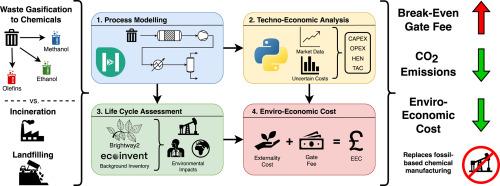废物到x:通过城市固体废物气化量化化学生产的环境经济绩效
IF 9.6
1区 环境科学与生态学
Q1 ENVIRONMENTAL STUDIES
引用次数: 0
摘要
目前世界各地采用的不适当的废物处理方法正在对当地人口和周围环境造成重大损害。与此同时,化工行业正面临着从不可持续的线性经济模式转向更循环的经济模式的压力。城市固体废物(MSW)气化是一项越来越受到关注的技术,因为它为这两个问题提供了统一的解决方案。在这项工作中,将城市生活垃圾气化与三种化学制造路线(甲醇、甲醇制烯烃和乙醇)相结合的经济和环境性能与填埋和焚烧作为废物处理方法进行比较。详细的过程模拟与终端环境影响的货币化相结合,以确定废物处理的环境经济成本(EEC)。尽管所有气化路线的资本支出都很高,但如果产生的二氧化碳被回收并送往储存(CCS),那么收支平衡的门槛费用与垃圾填埋和焚烧相比都具有竞争力。然而,如果二氧化碳被回收和利用(CCU),由于更高的绿色H2需求,盈亏平衡门槛费用显着更高。甲醇和MTO路线都可以显著减少对环境的影响,因为它们抵消了基于化石的化学制造。所有气化路线的预测EEC都低于垃圾填埋和焚烧,甲醇与CCS相结合的整体EEC最低,为- 0.21英镑/kgMSW。通过生活垃圾气化用CCU生产甲醇可能是短期内最可行的选择,因为它不依赖于现有的二氧化碳管道基础设施,但它仍然需要通过更高的垃圾填埋和碳税来获得政策支持。总的来说,这项工作强调了将化学制造与城市生活垃圾气化相结合的潜在环境效益。本文章由计算机程序翻译,如有差异,请以英文原文为准。

Waste-to-X: Quantifying the enviro-economic performance of chemical production via municipal solid waste gasification
Inadequate waste disposal methods currently employed around the globe are leading to substantial damage to both local human populations and the surrounding environment. Simultaneously, the chemical sector is facing pressure to shift from an unsustainable linear economy model and towards a more circular one. Municipal solid waste (MSW) gasification is a technology which is garnering increased attention as it offers a unified solution to both these issues. In this work, the economic and environmental performance of MSW gasification coupled with three chemical manufacturing routes (methanol, olefins via methanol-to-olefins, and ethanol) were compared to landfilling and incineration as a waste disposal method. Detailed process simulation is coupled with the monetisation of endpoint environmental impacts to determine the enviro-economic cost (EEC) of waste processing. Despite the high capital expenditure for all of the gasification routes, the break-even gate fees are competitive with both landfilling and incineration if the CO produced is recovered and sent to storage (CCS). However, if the CO is recycled and utilised (CCU), the break-even gate fees are significantly greater due to a higher green H demand. Both methanol and MTO routes offer significant reductions in environmental impacts due to offsetting fossil-based chemical manufacturing. All gasification routes have predicted EECs lower than both landfilling and incineration, with methanol coupled with CCS resulting in the lowest overall EEC at −£0.21/kgMSW. Methanol production with CCU via MSW gasification is likely to be the most feasible option in the short term as it does not rely on the existence of CO pipeline infrastructure, but it would still need policy support via higher landfilling and carbon taxes. Overall, this work highlights the potential environmental benefit in coupling chemical manufacture with MSW gasification.
求助全文
通过发布文献求助,成功后即可免费获取论文全文。
去求助
来源期刊

Sustainable Production and Consumption
Environmental Science-Environmental Engineering
CiteScore
17.40
自引率
7.40%
发文量
389
审稿时长
13 days
期刊介绍:
Sustainable production and consumption refers to the production and utilization of goods and services in a way that benefits society, is economically viable, and has minimal environmental impact throughout its entire lifespan. Our journal is dedicated to publishing top-notch interdisciplinary research and practical studies in this emerging field. We take a distinctive approach by examining the interplay between technology, consumption patterns, and policy to identify sustainable solutions for both production and consumption systems.
 求助内容:
求助内容: 应助结果提醒方式:
应助结果提醒方式:


